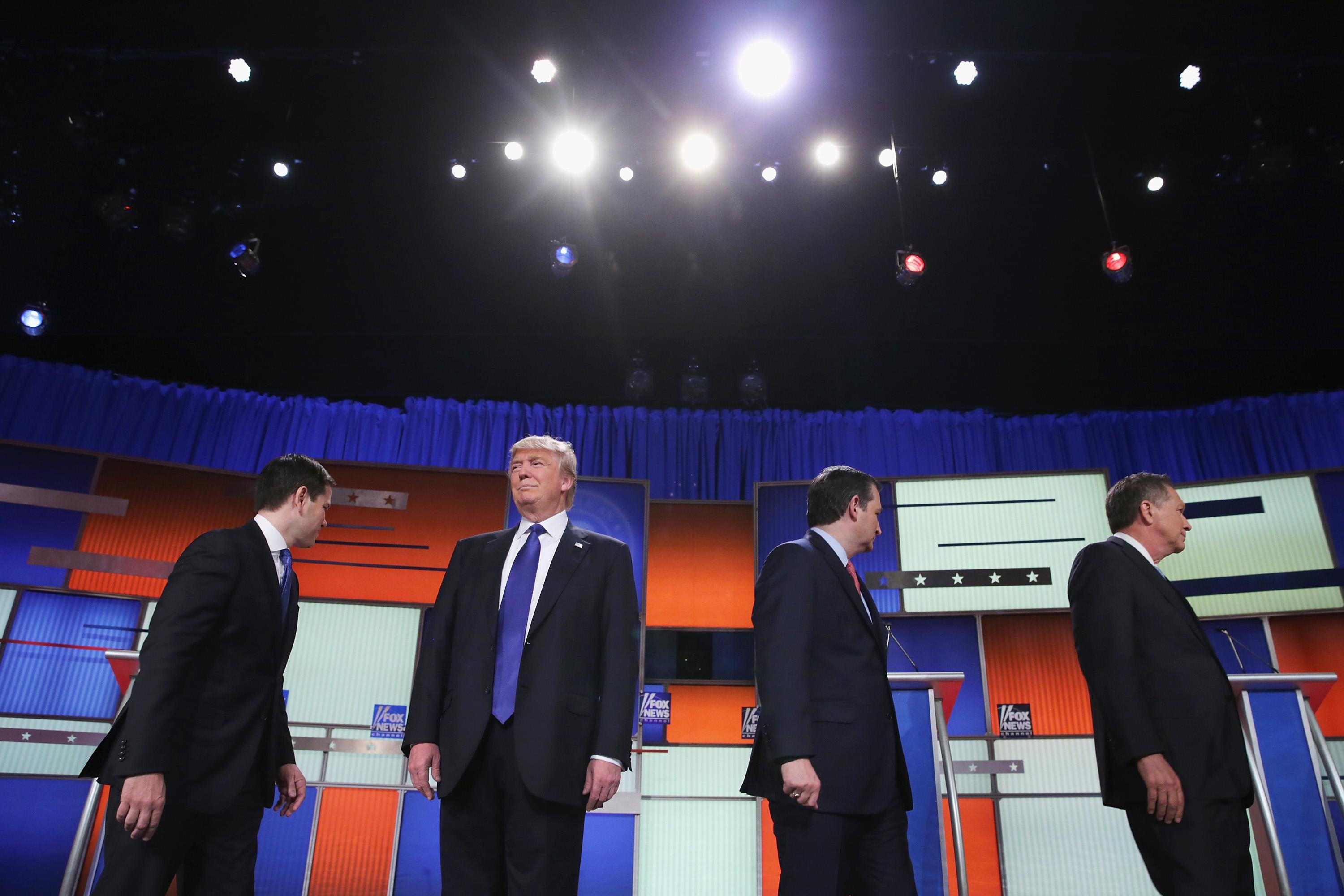Here is a small sampling of what non-Trump Republican presidential candidates had to say about Donald Trump in the lead-up to Thursday night’s debate in Detroit.
“[P]eople will wake up,” said Marco Rubio in a Sunday interview with John Dickerson of CBS News’ Face the Nation, “and we’re not going to allow a con artist to take over the party of Lincoln and Reagan.”
“Listen, if Donald becomes president, who the heck knows what he would do? Even Donald doesn’t know what he would do,” said Ted Cruz, in an interview with CNN’s Jake Tapper. “And I think the challenges facing this country are too grave to roll the dice and risk losing the Supreme Court for a generation, risk yet more economic stagnation and risk on foreign policy allowing radical Islamic terrorism to continue to rise and threaten America.”
“Apparently, he refused to disassociate himself from white supremacists,” said John Kasich during a town hall in Ohio. “Every day it’s another thing. That’s just horrific, right? We don’t have any place for white supremacists in the United States of America. It doesn’t make any sense. He really needs to make his position clear, and he ought to do it quickly.”
Between the three men, you have a scathing indictment of Trump: He’s a con artist who defrauds ordinary Americans; he’s unfit to do the basic duties of the president of the United States; he associates with the worst elements in our society.
Obviously then, neither Rubio nor Cruz nor Kasich would support Trump if he won the nomination. Obviously, for them, a candidate this reckless and destructive shouldn’t be elevated to the presidency, even if he shares an R next to his name on the ballot.
“I’ll support Donald if he’s the Republican nominee, and let me tell you why,” said Rubio, when Fox News moderator Bret Baier press him on that question at the end of Thursday’s debate. “We must defeat Hillary Clinton.”
Cruz said the same. “Yes, because I gave my word that I would. And what I have endeavored to do every day in the Senate is do what I said I would do.”
And while Kaisch took his time with his answer—deploying a strange, circular metaphor—he eventually affirmed his colleagues on the stage. “Look, when you’re in the arena, and we’re in the arena. And the people out here—we’re in the arena, we’re traveling, we’re working, we spend time away from our family, when you’re in the arena, you enter a special circle,” he said. “And you want to respect the people that you’re in the arena with. So if he ends up as the nominee—sometimes, he makes it a little bit hard—but, you know, I will support whoever is the Republican nominee for president.”
Earlier, I criticized Mitt Romney for making his moral argument against Trump subordinate to his electoral one—that the real estate mogul would lead the Republican Party to crushing defeat and place Hillary Clinton in the White House. At the same time, Romney’s speech—a forceful attack on Trump as a threat to democracy—was an unprecedented step, the closest thing we’ve seen to a complete disavowal of Trump. And in small ways, it filtered down to the Republican presidential candidates. Rubio, for instance, hammered Trump on his business record while Cruz went after him for supporting Democrats. Romney, it seems, had given new life to the anti-Trump effort, days after the demagogic reality TV star dominated Super Tuesday.
With those final answers, however, the effort fell flat. No, they weren’t the worst part of the debate—that goes to the brief exchange on lead poisoning in Flint, where Rubio praised Gov. Rick Snyder for his handling of the crisis, despite growing evidence of neglect and incompetence, with deadly consequences for the city’s residents—but they deflated Romney’s anti-Trump argument, revealing the extent to which it’s a hollow exercise and undermining every legitimate attack they made during the night.
As long as Rubio, Cruz, Kasich and the rest of the Republican Party are willing to support Trump as the nominee, it doesn’t matter what they say or how they insult him—Trump retains his stature as a legitimate figure in the Republican Party. Which, as he accumulates votes and delegates, makes him harder to stop.
Despite two hours of arguing, the Republican presidential candidates said little about public policy. Indeed, watching their debate, you’d have no sense of the nation’s problems, from wage stagnation and inequality to climate change and criminal justice reform. But one thing is clear: The anti-Trump movement is overrated. If he wins the nomination, Republicans will fall in line, more eager to win the Oval Office than stop a dangerous strongman.
